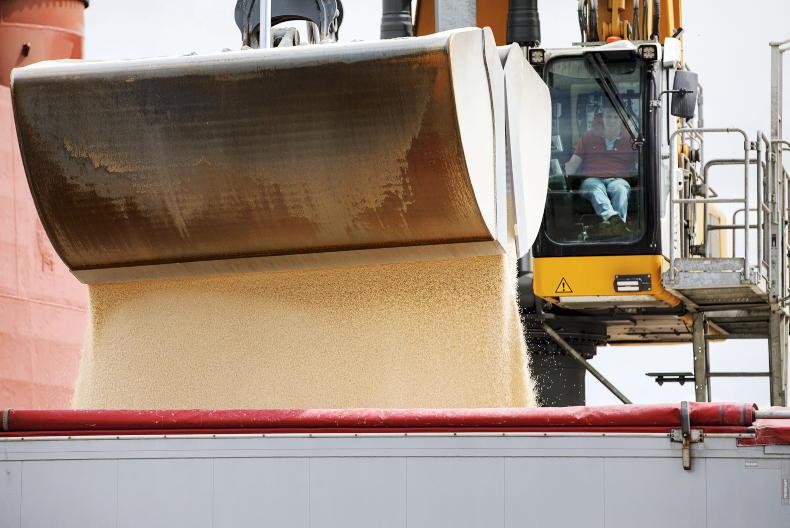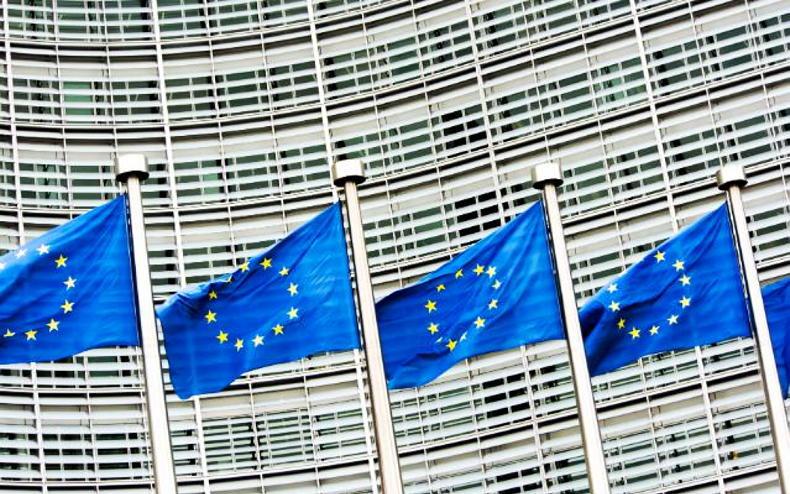US president Donald Trump announced that the US will introduce a 20% “reciprocal” tariff on all imports from the European Union.
Trump produced a country-by-country list of the new import duties, with the lowest level of 10% being imposed on shipments from the United Kingdom. He confirmed that a 25% tariff on imported cars will be imposed.
During his speech, he singled out US farmers and said that he’d put a stop to unfair tariffs and trade barriers, specifically mentioning Canadian dairy tariffs and the EU ban on US chicken. However, he announced no specific measures to help US farmers.
Trump, so far, has also announced no sector-specific tariffs for Irish dairy and whiskey exports to the US.
While a tariff of 20% is going to make European products more expensive to consumers in the US, the level is well below some of the numbers mooted by Trump in the recent weeks.
The tariff levels were highest for Asian nations, with China being hit with 34% import duties. The full list of countries is below:
Pakistan 58%.Vietnam 46%.Thailand 36%.China 34%.Taiwan 32%.Switzerland 31%.South Africa 30%.India 26%.South Korea 25%.European Union 20%.Israel 17%.Brazil 10%.UK 10%.What does this do to Irish butter sold in the US?
Ireland charges the US around €8.60 for 1kg of butter. A 20% tariff would, in theory, increase the cost of the same 1kg of butter to €10.32 to the importer.

Kerrygold butter on the US shelves.
However, how much of the tariffs that gets passed on to the consumer depends on how US retailers react. They may choose to absorb some of the tariff cost and not pass it on to their customers.
Ireland disadvantaged - IFA
In an initial reaction to the announcement of the tariffs, the Irish Farmers Association (IFA) said that the relative differences will affect the competitiveness of Irish products on the US market, including Kerrygold.
"The fact that New Zealand only has a 10% tariff for dairy products and the UK only has a 10% tariff on drinks, while the EU will have 20% tariffs, will leave us at a competitive disadvantage against some of our biggest competitors in these two sectors," a statement from the organisation outlined on Wednesday night.
Kerrygold is the second-best-selling butter brand in the US, with almost €500m worth of product sold there in 2024. The market accounts for about 7.5% of total Irish dairy exports.
Transatlantic trade
Ibec CEO Danny McCoy, whose members include Meat Industry Ireland and Dairy Industry Ireland processors, said it was "deeply disappointed" by the decision to impose 20% tariffs on imports from the EU, "particularly given the impact it will have on transatlantic trade and consumers".
He called on the Irish Government and the European Commission to act with urgency to find a negotiated solution with the US administration.
"The Government must advocate for a proportionate and measured EU response, informed by a detailed analysis of supply chains, strategic considerations and the broader implications of any retaliatory measures," he said.
Export impact
The Ibec CEO said that it anticipates that the new tariffs will result in a net overall export impact of around 2% to 3% in the short term.
"Thankfully, we are in a position of economic strength, which will provide the necessary cushion to absorb slower growth and invest in diversifying market opportunities," McCoy said.
He called for COVID-era-style supports to keep employees connected to businesses experiencing demand shocks, as well as other measures to enhance productivity and access to new markets.
More to follow.
Read more
US tariff impact on Irish agriculture
US president Donald Trump announced that the US will introduce a 20% “reciprocal” tariff on all imports from the European Union.
Trump produced a country-by-country list of the new import duties, with the lowest level of 10% being imposed on shipments from the United Kingdom. He confirmed that a 25% tariff on imported cars will be imposed.
During his speech, he singled out US farmers and said that he’d put a stop to unfair tariffs and trade barriers, specifically mentioning Canadian dairy tariffs and the EU ban on US chicken. However, he announced no specific measures to help US farmers.
Trump, so far, has also announced no sector-specific tariffs for Irish dairy and whiskey exports to the US.
While a tariff of 20% is going to make European products more expensive to consumers in the US, the level is well below some of the numbers mooted by Trump in the recent weeks.
The tariff levels were highest for Asian nations, with China being hit with 34% import duties. The full list of countries is below:
Pakistan 58%.Vietnam 46%.Thailand 36%.China 34%.Taiwan 32%.Switzerland 31%.South Africa 30%.India 26%.South Korea 25%.European Union 20%.Israel 17%.Brazil 10%.UK 10%.What does this do to Irish butter sold in the US?
Ireland charges the US around €8.60 for 1kg of butter. A 20% tariff would, in theory, increase the cost of the same 1kg of butter to €10.32 to the importer.

Kerrygold butter on the US shelves.
However, how much of the tariffs that gets passed on to the consumer depends on how US retailers react. They may choose to absorb some of the tariff cost and not pass it on to their customers.
Ireland disadvantaged - IFA
In an initial reaction to the announcement of the tariffs, the Irish Farmers Association (IFA) said that the relative differences will affect the competitiveness of Irish products on the US market, including Kerrygold.
"The fact that New Zealand only has a 10% tariff for dairy products and the UK only has a 10% tariff on drinks, while the EU will have 20% tariffs, will leave us at a competitive disadvantage against some of our biggest competitors in these two sectors," a statement from the organisation outlined on Wednesday night.
Kerrygold is the second-best-selling butter brand in the US, with almost €500m worth of product sold there in 2024. The market accounts for about 7.5% of total Irish dairy exports.
Transatlantic trade
Ibec CEO Danny McCoy, whose members include Meat Industry Ireland and Dairy Industry Ireland processors, said it was "deeply disappointed" by the decision to impose 20% tariffs on imports from the EU, "particularly given the impact it will have on transatlantic trade and consumers".
He called on the Irish Government and the European Commission to act with urgency to find a negotiated solution with the US administration.
"The Government must advocate for a proportionate and measured EU response, informed by a detailed analysis of supply chains, strategic considerations and the broader implications of any retaliatory measures," he said.
Export impact
The Ibec CEO said that it anticipates that the new tariffs will result in a net overall export impact of around 2% to 3% in the short term.
"Thankfully, we are in a position of economic strength, which will provide the necessary cushion to absorb slower growth and invest in diversifying market opportunities," McCoy said.
He called for COVID-era-style supports to keep employees connected to businesses experiencing demand shocks, as well as other measures to enhance productivity and access to new markets.
More to follow.
Read more
US tariff impact on Irish agriculture










SHARING OPTIONS